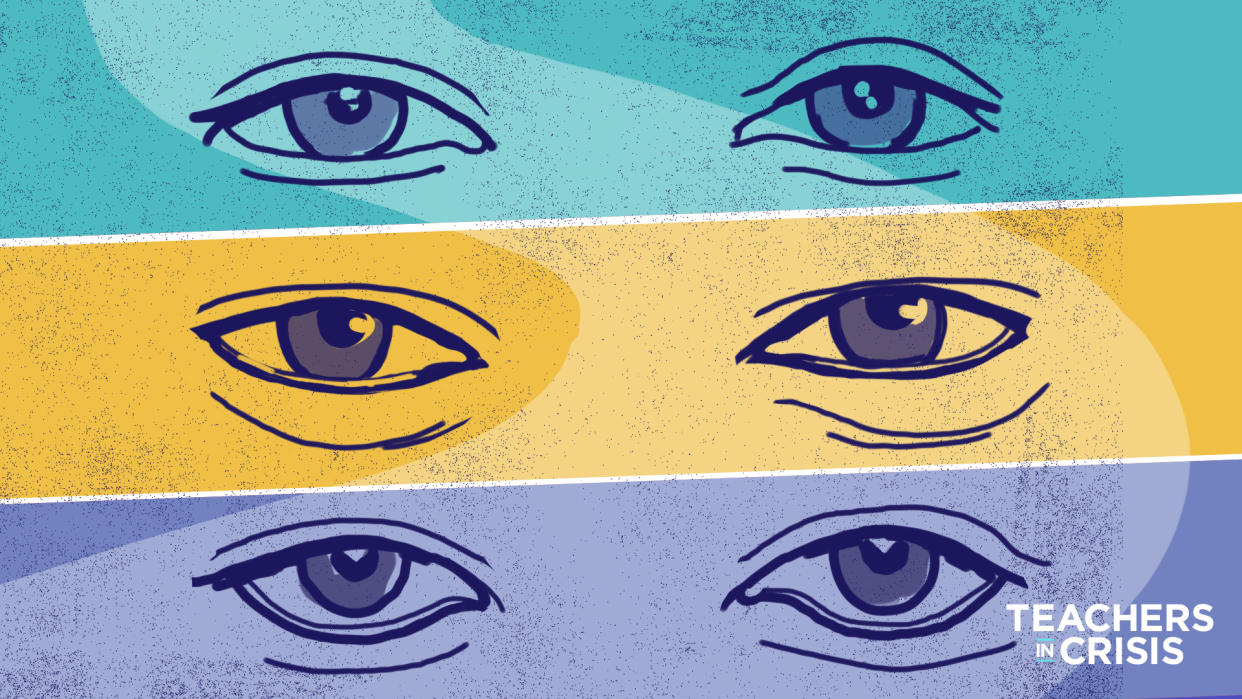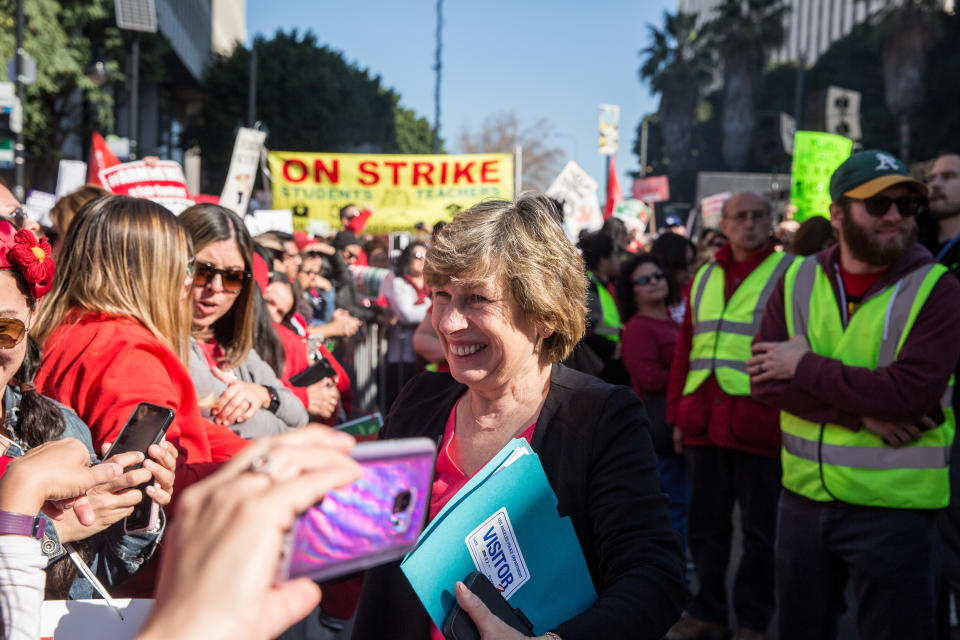Teacher union leader Randi Weingarten on America's education crisis: 'Teachers are now first responders to everything'

As president of the American Federation of Teachers (AFT) and its 1.7 million members in more than 3,000 local affiliates across the country — after years of leading the New York City teachers’ union and of being a high school educator herself — Randi Weingarten knows a thing or two about teachers.
Serving as such a powerful leader has, of course, made her a political lightning rod, including through her ongoing public battle with Education Secretary Betsy DeVos (the U.S. Department of Education did not respond to Yahoo Lifestyle’s request for comment).
Still, in light of the sheer number of teachers represented by the AFT, with a mission to champion “fairness; democracy; economic opportunity; and high-quality public education, health care and public services for students, their families and communities,” Yahoo Lifestyle checked in with Weingarten about what appears to be a full-blown U.S. teacher crisis, pushing educators out of the field in record numbers due to stressors that have stretched them to the breaking point — not only financially, but physically and mentally.
Here’s how Weingarten — ever the optimist — sees it.

Yahoo Lifestyle: How would you put America’s teacher crisis into context for those who haven’t been following along?
Randi Weingarten: Teachers are now first responders to everything — school shootings, mass shootings, the Trump effect on schools of divisiveness and bullying and hateful rhetoric, the opioid addiction. A lot of these outside stressors are part and parcel of what teachers deal with, because the wellbeing of students is first and foremost. It used to be our obligation was to instruct students.
So, that’s number one. Number two, it's also the disempowerment that teachers themselves feel — and not just the testing and the fixation on testing — but it's the sense that that test score, rather than teaching and learning, is all-encompassing and all-being ... with consequences that if the test scores are not high enough, teachers can be fired, schools can be closed.
It’s an old set of stressors because teachers want the freedom to teach and they want to meet the needs of their kids instructionally, not have the pacing calendar and the test score be the be-all, end all. And that’s not to say teachers are saying, “I just want to walk in and teach whatever I want to teach,” but they want to be able to actually go deep and do project-based instruction and take more than 20 minutes to go topically on something just so that somebody can check it off and say, “OK, that’s covered!”
And then there is pay and other compensation. Just like for everyone else in America, soaring health care costs are stressful, even when we can collectively bargain it ... And on top of that, you have student loans. The average student loan for a master's degree in education jumped 82 percent between 2002 and 2012. So, if you think about how teachers make about 24 percent less than similarly skilled professionals, and their loan payments are significantly higher — and then everything else that everybody else is facing, like housing costs and health care costs — you see why people feel just completely overburdened.

What do you feel is at the root of teachers being historically undervalued in our society?
At the end of the day, it comes down to [the fact that] we're a female profession, disproportionally, and that gets devalued. And number two, as much as we as Americans say, “It's really important,” it’s one of the only things that the country hasn’t wanted to pay for. And it is really important to our future — writ large — not just to parents who have kids who are growing up. It's important in terms of the economy. It's important in terms of national security. Who knows who the next president is that we're teaching? Or the next person who can get to the moon, or figure out the cure for cancer? We think about education as important in the abstract, but don't always value it in terms of paying for it.
Are there still enough teachers fighting, as activists, for change in education?
More than ever. It used to be generational. But what we see now is, I think, with the Women's March and Trump's election, the sense that something is wrong in this country — that there's not a respect for diversity. I see our younger members taking on social justice issues. For example, [union members] said, “Walmart, use your clout to put some pressure on the Republicans to do some sensible gun safety measures.” That was teachers who were mostly younger.
In Chicago, one of the real reasons for their strike last winter — for the unionized teachers who work in charters — was to stop ICE agents. They teach disproportionate Latino populations, and their kids and parents were really concerned that ICE agents would walk into a school without a warrant. And one of the key demands of that strike was that the schools — the UNO schools, not just the city schools in Chicago — take on a kind of sanctuary status to demand that if somebody tried to deport kids, they would have to come in with a warrant.
You see this with our teachers in Austin, in El Paso, in so many of the border communities really wrestling with how to help make sure that immigrants are welcome. There is that sense of activism that's really embedded in making a difference in the lives of kids.
How are politics, and specifically the 2020 election, playing a part in teachers’ issues?
I think about where we were 10 years ago and where we are now. And 10 years ago, we were constantly in a battle with the privatizers and the austerity hawks and the anti-public-education and anti-union voices wanting to define public education as how many bad teachers there were. That narrative has completely changed — and you can't change the policies unless you change the narrative. Now it’s about, how are we going to do this? How are we going to make sure that we have the teachers that we need, the funding that we need? That we meet every child where they are? And that includes a focus on wellbeing as well as on instruction.
Virtually all of the [Democratic] candidates have come up with education plans. They're all focused on public education as an anchor to the democracy, as a propeller of our economy — as a way that we actually help make a difference in children's lives as opposed to lifting up charters or vouchers or whatever.
They are all starting to talk about public education — how we fund it, how we help support teachers, how we create the kind of options within public schools that kids need. And that is a huge change, in terms of the narrative around public education.
Now we have to change policies, and changing policies require changing politics. Look at what happened to New Mexico: A great new governor was elected in ’18 who just did a huge investment in education, which he calls a “moonshot,” and where there are community schools … so that kids have after-school programs and mental health supports and health care programs and enrichment programs, plus programs for teacher diversity.
Look at Illinois, where a great new governor is really trying to get a state income tax in order to actually fully fund public education. Look at Michigan, where the new Democratic governor ran [a campaign] on its schools and the damn roads. The value system has to be real. The [narrative must change] to where public education is not only important once again, but to where people are embracing it as something absolutely vital to our society.
All that said, when we look at the current reality for teachers, it can seem dire. What does the future look like? Will it all implode?
This is what I would say. I have this poster in my office — someone gave this to me about 25 years ago and I still have it, and I hear it from teachers all the time. It says, “I inspire, I encourage, I empower, I nurture, I activate, I motivate, I change the world. I am a teacher.” And educators tell us they want to change the world, one child at a time. People, even with all of this, they have the passion for kids. They teach because our democracy needs it. They teach because the next generation needs it. And I just love teachers, because even with all of that, so many of them stay in the classroom because they want to make a difference in the lives of kids.
If you’re a teacher who wants to share your story, send an email to [email protected]
Read more from Yahoo Lifestyle:
'Things have just gotten so bad': Why teachers in America are leaving the classroom for good
Florida teacher says the profession is no longer sustainable: ‘Who wants to be poor by choice?’
Follow us on Instagram, Facebook and Twitter for nonstop inspiration delivered fresh to your feed, every day.


